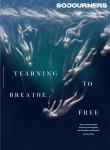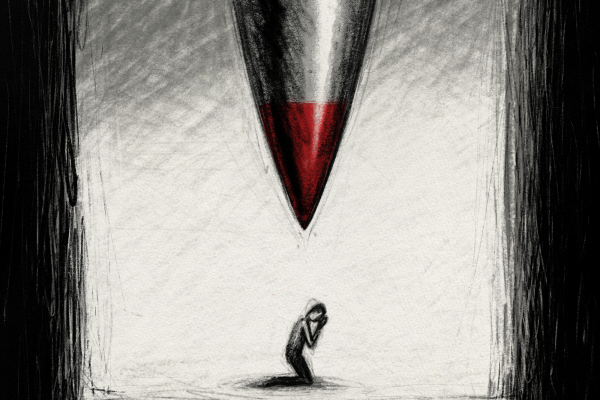CONSCIENCE, REMARKED MORAL theologian Richard Gula, “is another word like ‘sin’—often used but little understood.”
As a teenager growing up in the naval stronghold of San Diego during the Reagan era, I experienced a recurring nightmare about war with the Soviet Union, which became darker as I learned more about the U.S. atomic bombings of Hiroshima and Nagasaki, which took place 75 years ago this August. During that time Joan Kroc, an anti-nuclear leader who was also principal owner of the San Diego Padres baseball team, and others organized Mothers Embracing Nuclear Disarmament. On the 40th anniversary of the Hiroshima and Nagasaki bombings, thousands gathered in Balboa Park, and my fear was transformed into a conviction of conscience to work for nuclear disarmament.
Conscience involves the capacity to discern and choose the morally right course of action in a particular situation. In doing so, a person brings to bear a lifelong process of formation of conscience. Each person has the obligation to form his or her conscience as fully as possible, and to follow it.
The formation of conscience is highly personal and socially situated. Hebrew and Christian scriptures, as well as theological writings such as those by St. Augustine, provide steps for building moral character, teaching moral reasoning, and forming our moral conscience to offer judgment based in practical reason to recognize and seek what is good and to reject what is evil.
This process for engaging Christian moral thinking involves four key elements:
- Be open to the truth and draw upon the prudent wisdom of personal and communal experience.
- Seek reliable teaching, including from scripture and Christian tradition.
- Review the best available information and consult trusted persons with relevant expertise.
- Engage prayerful discernment and conscientious action through the gift of the Holy Spirit to guide one’s application of moral values in each case.
Crises of conscience
NUCLEAR WEAPONS HAVE created crises of conscience since their inception. In the 1940s, Joseph Rotblat was a young Polish-born physicist working on the Manhattan Project, the U.S. government program that produced the first nuclear weapons. By early 1944, the initial goal of developing nuclear capability before Nazi Germany could do so had given way to attaining leverage over the Soviet Union. In March 1945, Gen. Leslie Groves, director of the Manhattan Project, acknowledged as much in casual dinner conversation among colleagues at the atomic weapons lab in Los Alamos, N.M.
For Rotblat, Grove’s aside proved decisive in shaping his own opposition to the project. At a time when Germany could still have prevailed and Russian soldiers were dying by the thousands in order to defeat the Germans, “Groves was speaking of them as if they were the enemy, more than the Germans.” Rotblat resigned from the Manhattan Project on moral grounds. In 1955, he co-authored a public letter with Albert Einstein and others opposing the nuclear weapons race. He won the Nobel Prize for peace in 1995 and wrote, “Throughout my career, I will consider the ethical implications of my work before I take action.”
Arriving at a decision point
MICHAEL IZBICKI GRADUATED from the U.S. Naval Academy in 2008 and was selected to be a nuclear submarine officer. He trained to operate the S5W nuclear reactor as the engineering officer of the watch. However, a spiritual transformation fueled by Christianity’s teachings to “love your enemy” led Izbicki to the realization that he couldn’t participate in war.
Izbicki grew up in a military community adjacent to the Marine Corps base at Camp Pendleton in California. When he decided to join the military, he was encouraged in his decision by a Christian pastor and military veteran. In a 2013 TED talk, Izbicki recalled his own desire to “kill the bad guys” and “spread freedom and democracy throughout the world.”
Following his graduation from the Naval Academy, he completed graduate work in preparation for his chosen nuclear submarine assignment. Seeking to deepen his faith as part of becoming a better naval officer, he began to study scripture, particularly the Sermon on the Mount. He became convinced about the clear call of Jesus to love one’s enemies and to return love for hate. For Izbicki, a tension developed between Jesus’ teaching and the new naval officer’s preparations to launch submarine-based nuclear missiles.
Izbicki had relatively reliable information on what a nuclear-tipped missile could do, but he needed clarification about the morality involved in pushing the button. He studied early Christian writings. He found moral exemplars, such as Cyprian of Carthage, who wrote favorably about Christians who rejected military service, and Martin of Tours, who left military service for reason of conscience; both had taken Jesus at his word. Though Izbicki was an active Christian all his life, he had never heard about the rich Christian tradition of rejecting war and violence.
Izbicki read modern Christian thinkers, such as Catholic leader Dorothy Day and Baptist pastor Martin Luther King Jr., and admired the continuity between their convictions and actions. Izbicki wrestled with the gap between the values he espoused and the military reality to which he had committed himself. At the Naval Academy, he had studied the just war tradition and “wanted our military to live up to the ideals of just war theory,” he said. Instead, he witnessed disregard for noncombatant lives in some Marines who boasted of killing civilians.
Eventually, Izbicki sought consultation with a trusted person with relevant expertise. He went to talk to his military chaplain. There he learned for the first time about the military code pertaining to conscientious objection (CO). The chaplain suggested he fill out the CO application as part of his discernment process, a key step in Izbicki’s formation of conscience.
In his CO application, Izbicki stated, “I used to believe in a just war, but I don’t anymore.” He could not identify a war that had satisfied the criteria of just war theory. He was troubled by the wasteful, exorbitant expenditure on nuclear weaponry, citing the $345 billion slated for 12 new nuclear submarines. He pondered the many other more necessary uses of such a vast sum, such as education. “Our nuclear arsenal is already way out of proportion to any threat that we face,” he wrote.
In 2009, Izbicki arrived at a decisive point, often called the “crystallization of conscience.” As part of his preparation for submarine training, he was given a psychological exam. He was asked if he could launch a nuclear missile if ordered to do so. He answered no. He acknowledged for the first time that he could no longer perform the military duties asked of him because it conflicted with his Christian beliefs.
In 2011, after a year and a half of opposition from the naval command, including litigation, Michael Izbicki was honorably discharged as a conscientious objector.
What Izbicki modeled at the personal level is, in fact, a process that everyone in this country is called to emulate—a moral necessity for all those living in a nation that continues to develop, maintain, and threaten to use nuclear weapons.
Acts of symbolic disarmament
POPE FRANCIS’ TEACHINGS on nuclear weapons are an invitation into forming the social consciences of Christians around the world, not only Catholics. In 2017, he told participants at a world conference on nuclear weapons that humanity cannot fail “to be genuinely concerned by the catastrophic humanitarian and environmental effects of any employment of nuclear devices ... If we also take into account the risk of an accidental detonation as a result of error of any kind, the threat of their use, as well as their very possession, is to be firmly condemned.”
Six months after Francis’ declaration, in April 2018, seven Catholics cut the fence at Kings Bay Naval Submarine Base in St. Marys, Ga., and entered the base to perform liturgical acts of symbolic disarmament. Kings Bay is home port to six ballistic missile Trident submarines, each of which deploy 20 Trident missiles carrying four or more warheads of at least 100 kilotons. The Hiroshima bomb was 14 kilotons. Each submarine has the destructive power of more than 500 Hiroshima bombs.
Recalling the prophet Isaiah’s invitation to “beat swords into plowshares,” the Kings Bay Plowshares 7, as they are known, prayed, poured blood, spray-painted messages against nuclear weapons, hammered on a replica of a nuclear weapon, hung banners, and waited to be arrested. Having spent years learning about nuclear weapons and months bringing their concerns into prayerful discernment and communal discussion, Mark Colville, Clare Grady, Martha Hennessy, Elizabeth McAlister, Patrick O’Neill, Carmen Trotta, and Father Stephen Kelly decided personally and as a group to engage in proactive civil resistance. Their acts were both the result of and the perpetuation of an authentic social conscience.
The Kings Bay 7 have been found guilty of conspiracy, trespassing on naval property, depredation of government property, and destruction of property on a naval installation. They face up to 25 years each in federal prison. McAlister was sentenced in early June to time served, after serving more than 17 months in pretrial confinement; the others were scheduled to be sentenced in late June.
Three challenges
THE WITNESS AGAINST nuclear weapons at the Kings Bay naval base highlights three challenges that nuclear weapons present to Christians forming their personal and social conscience: access to credible information; intersectional injustice; and genocide and ecocide.
President Dwight Eisenhower famously warned in 1961 of the political pressure exerted by the military-industrial complex and, according to nuclear industry journalist Stephanie Cooke, the “danger that public policy could itself become the captive of a scientific-technological elite.” By ignoring that warning, Cooke argues, we’ve enabled “a huge, secretive, self-rationalizing system to take on a life of its own, backed by history, money, power, and a default conviction in its own inevitability.”
Formation of conscience regarding nuclear weapons is helped by unmasking and examining that secretive system, much in the way that Joseph Rotblat, Michael Izbicki, and the Kings Bay Plowshares 7 did through their forms of public witness.
For members of the military, scientific, and manufacturing communities responsible for the production, maintenance, and potential use of nuclear weapons, pastoral support is necessary to help them hold their work up to the light of conscience. Church communities, particularly those serving military families, can educate their congregants on nuclear weapons and on the economics of the nuclear weapons industry that is interwoven with economic exploitation of people of color, such as placing nuclear waste sites in poor communities. Paying attention to narratives such as Izbicki’s sharpens the ethical questions at stake.
Through the expansive reach of transnational corporations, the nuclear weapons industry is, by design, spread throughout the U.S. and across the globe. Every taxpayer and many people with 401(k) investments are financing the research, development, and maintenance of nuclear weapons. Between fiscal years 2018 and 2047, the total price tag of U.S. nuclear forces will be an estimated $1.7 trillion, adjusted for inflation.
The production and maintenance of nuclear weapons produces deadly nuclear waste. Here Martin Luther King’s interconnected web of “racism, militarism, and materialism” is evident. At Rocky Flats in Colorado, where plutonium bomb cores were made, “infinity rooms,” where the radiation was so high it couldn’t be measured, were sealed off by lead panels and left forever. Other areas, such as the Oak Ridge nuclear complex near Knoxville, Tenn., and the Hanford nuclear site on the Columbia River in eastern Washington, now carry the designation “national sacrifice zones,” a phrase coined by engineers at the Department of Energy in the 1980s for sites too expensive to clean up. The U.S. is poorly equipped to deal with its deadly radioactive waste.
To date, the U.S. does not have a permanent disposal facility or proven technical means to process and store radioactive waste. As a default, Indigenous environmental activist Winona LaDuke noted, “Much of the world’s nuclear industry has been sited on or near Native lands. Some 70 percent of the world’s uranium originates from Native communities.” Navajo land is home to more than 1,000 abandoned uranium mines. In the absence of federal standards or an organized reclamation plan, some Indigenous communities, such as the Navajo and Laguna Pueblo, have forced the federal government to develop a clean-up plan for their lands.
Seventy-five years is enough
THE DEVELOPMENT OF nuclear weapons took root in a trend toward the increasing destructive capacity of conventional weaponry and concomitant disregard for noncombatant life, as well as ideological rationalizations for extermination of whole peoples and cultures, or genocide.
Nuclear weapons development prepared the way for a sort of inertial acceptance of mass extermination of not just the human species but also the whole ecosphere, or ecocide.
As Fate of the Earth author Jonathan Schell wrote, “nuclear weapons and nuclear strategy, which actually trade on genocide for political purposes, called mutual assured destruction, threaten not just individual people, in however large numbers, but the order of creation, natural and human, and this is something new.”
At stake with nuclear weapons—their manufacture, maintenance, and accidental or purposeful use—is not only individual members of a wide variety of living systems (familial, social, political, economic, cultural, and ecological) but the very relational structures that bind them together.
This spring, with the COVID-19 pandemic looming, the Trump administration requested $44.5 billion “to sustain and modernize U.S. nuclear delivery systems and warheads and their supporting infrastructure,” a 19 percent increase in one year. As the United States faces a severe economic downturn leaving millions out of work, imagine what could be done with that money and an adequately formed public conscience.

Got something to say about what you're reading? We value your feedback!





